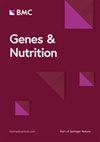高脂饮食雄性小鼠肠道-睾丸轴中 DMT1 和 miR-135b 的功能障碍
IF 3.5
3区 医学
Q1 Medicine
引用次数: 0
摘要
研究发现,肥胖患者容易缺铁,而饮食中铁的吸收不良是肥胖相关性缺铁症(ORID)的病因。二价金属转运蛋白 1(DMT1)和铁蛋白(FPN)是在十二指肠中表达的两种跨膜转运蛋白,与铁的吸收密切相关。然而,有关这两种蛋白与肥胖患者更易缺铁之间关系的研究却很少。慢性炎症也被认为是肥胖相关缺铁症的原因之一,这两种情况都会影响精子生成,损害男性生殖功能。根据以往的研究,肥胖症可通过配子发生跨代表观遗传。我们的研究结果表明,肥胖小鼠的血铁水平降低(P 0.05);精子 miR-135b 表达增加(P < 0.05)。生物信息学发现了九十个重叠基因,进一步分析表明,这些基因主要负责上皮纤毛运动、脂肪酸β-氧化、蛋白质去磷酸化、受精和谷氨酰胺转运,与小鼠的精子发生、精子发育和精子活力密切相关。在肥胖小鼠中,我们观察到十二指肠中 DMT1 的下调和精子中 miR-135b 的上调。本文章由计算机程序翻译,如有差异,请以英文原文为准。
Dysfunction of DMT1 and miR-135b in the gut-testis axis in high-fat diet male mice
Obese patients have been found to be susceptible to iron deficiency, and malabsorption of dietary iron is the cause of obesity-related iron deficiency (ORID). Divalent metal transporter 1 (DMT1) and ferroportin (FPN), are two transmembrane transporter proteins expressed in the duodenum that are closely associated with iron absorption. However, there have been few studies on the association between these two proteins and the increased susceptibility to iron deficiency in obese patients. Chronic inflammation is also thought to be a cause of obesity-related iron deficiency, and both conditions can have an impact on spermatogenesis and impair male reproductive function. Based on previous studies, transgenerational epigenetic inheritance through gametes was observed in obesity. Our results showed that obese mice had decreased blood iron levels (p < 0.01), lower protein and mRNA expression for duodenal DMT1 (p < 0.05), but no statistically significant variation in mRNA expression for duodenal FPN (p > 0.05); there was an increase in sperm miR-135b expression (p < 0.05). Bioinformatics revealed ninety overlapping genes and further analysis showed that they were primarily responsible for epithelial cilium movement, fatty acid beta-oxidation, protein dephosphorylation, fertilization, and glutamine transport, which are closely related to spermatogenesis, sperm development, and sperm viability in mice. In obese mice, we observed downregulation of DMT1 in the duodenum and upregulation of miR-135b in the spermatozoa.
求助全文
通过发布文献求助,成功后即可免费获取论文全文。
去求助
来源期刊

Genes and Nutrition
Biochemistry, Genetics and Molecular Biology-Genetics
CiteScore
7.90
自引率
0.00%
发文量
14
审稿时长
13 weeks
期刊介绍:
This journal examines the relationship between genetics and nutrition, with the ultimate goal of improving human health. It publishes original research articles and review articles on preclinical research data coming largely from animal, cell culture and other experimental models as well as critical evaluations of human experimental data to help deliver products with medically proven use.
 求助内容:
求助内容: 应助结果提醒方式:
应助结果提醒方式:


